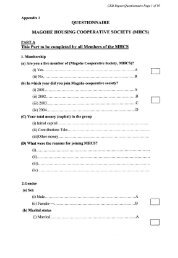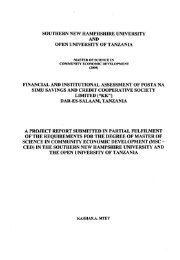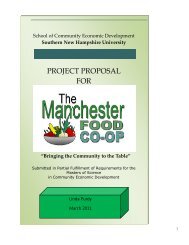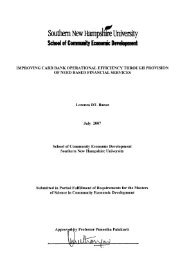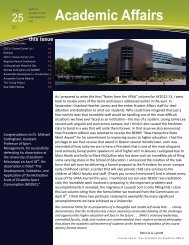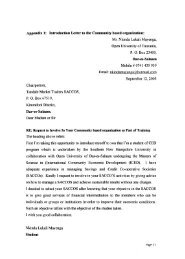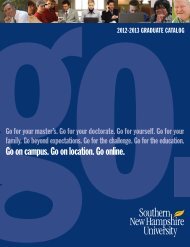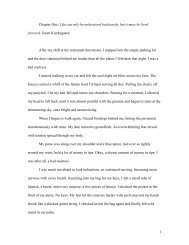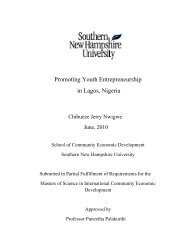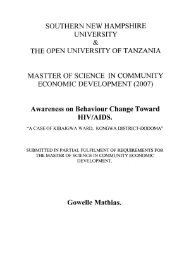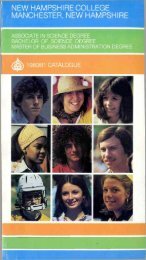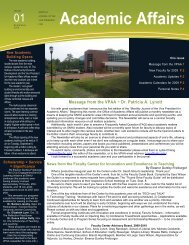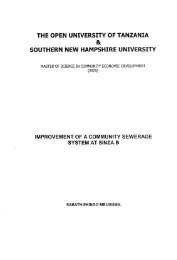3 - SNHU Academic Archive
3 - SNHU Academic Archive
3 - SNHU Academic Archive
Create successful ePaper yourself
Turn your PDF publications into a flip-book with our unique Google optimized e-Paper software.
84<br />
The Uniform Methodology estimates<br />
the parents contribution towards education<br />
on the basis of the amount of the parents'<br />
income and assets as well as a consideration<br />
of taxes, medical expenses, and other<br />
liabilities of the family. The student<br />
applicant's income, generally from summer<br />
employment prior to the academic year for<br />
which he/she is seeking assistance, and<br />
assets are also considered in estimating the<br />
total family resources which may be utilized<br />
to meet the student's cost of education.<br />
The difference between a student's<br />
cost of education and the estimated family<br />
contribution as well as support received<br />
from sources outside the College, is the<br />
student's demonstrated financial need. It is<br />
generally the College's policy to award<br />
scholarships and other student aid within the<br />
limits of a student's demonstrated financial<br />
need.<br />
New Hampshire Coilege ranks<br />
scholarship and assistance applications<br />
according to academic performance and<br />
considers each applicant in order of his/her<br />
grade-point-average, descending from the<br />
highest to the lowest. Incoming freshmen<br />
students are ranked according to their high<br />
school grade-point-averages; enrolled and<br />
transfer students according to their college<br />
grade-point averages.<br />
Priorities and entitlements under<br />
federal and state programs are recognized<br />
and honored as are institutional programs<br />
which carry commitments to specifically<br />
identified students.<br />
Students not entitled to special<br />
consideration compete for available funds<br />
on an academic basis within the limits of<br />
their demonstrated financial need. Where a<br />
student ranks within the applicant group may<br />
well have a bearing on the student's<br />
selection for participation, the percentage of<br />
need met and the make-up of his/her<br />
financial aid package; that is the balance<br />
between gift assistance and self-help (work<br />
assistance and loan assistance). It therefore<br />
behooves each student to recognize and<br />
diligently pursue his/her academic responsibilities.<br />
THE APPLICATION PROCESS<br />
Students who wish to apply for scholarship<br />
and student aid consideration should submit<br />
(1) a formal SCHOLARSHIP AND ASSIS-<br />
TANCE application form and (2) an acceptable<br />
financial statement, the College<br />
Scholarship Service's FINANCIAL AID<br />
FORM (FAF). New Hampshire College<br />
usually makes its determinations on an<br />
annual basis; in the springtime for the<br />
following academic year which includes<br />
terms starting on or after the next July 1 st.<br />
Freshmen students applying under the<br />
College's EARLY FINANCIAL AID OPTION<br />
have a deadline of December 15th.<br />
Other first time applicants, freshmen,<br />
transfer students and returning upperclassmen<br />
not currently having scholarships and<br />
assistance, have a deadline of March 15th.<br />
Renewal applicants, NHC students<br />
having scholarships and assistance during<br />
the current academic year, must reapply by<br />
April 15th. IT IS IMPORTANT to remember<br />
that student aid awards are not automatically<br />
renewed. YOU MUST APPLY EACH<br />
YEAR.



